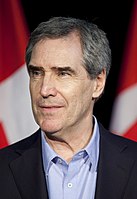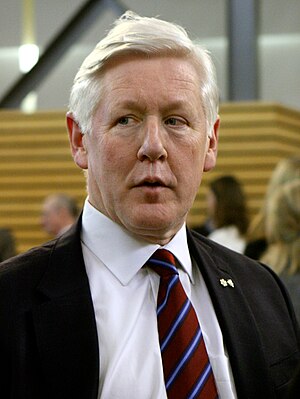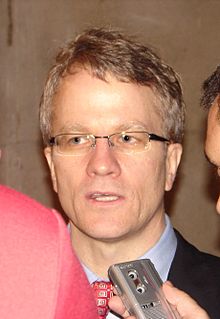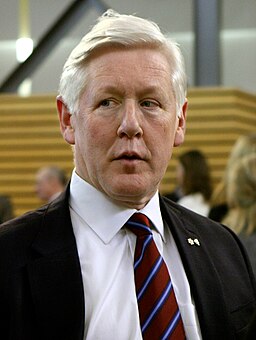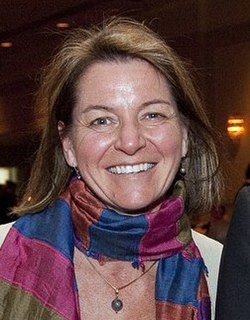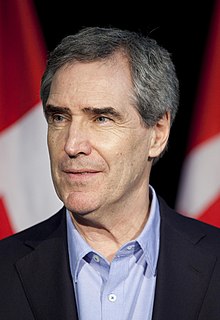| |||||||||||||
| |||||||||||||
| |||||||||||||
| Date | April 30 – May 2, 2009 |
|---|---|
| Convention | Vancouver Convention Centre Vancouver, British Columbia |
| Resigning leader | Stéphane Dion |
| Won by | Michael Ignatieff |
| Ballots | 1 |
| Candidates | 1 |
| Entrance Fee | $90,000 |
| Spending limit | $1,500,000 |
The Liberal Party of Canada leadership election of 2009 was prompted by Stéphane Dion's announcement that he would not lead the Liberal Party of Canada into another election, following his party's defeat in the 2008 federal election in Canada. The Liberals, who captured just slightly over 26 per cent of the total votes, scored their lowest percentage in the party's history to that date.
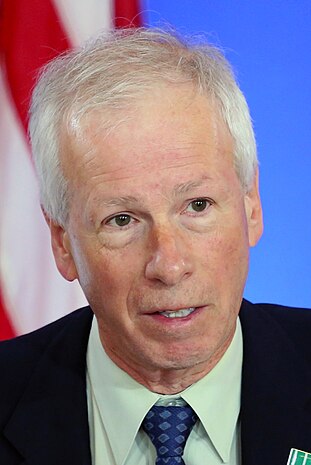
Stéphane Maurice Dion is a Canadian diplomat, political scientist, and former politician who has been the Canadian ambassador to Germany and special envoy to the European Union since May 2017. Dion was Minister of Foreign Affairs under Prime Minister Justin Trudeau from 2015 until he was shuffled out of Cabinet in 2017. He was also the Leader of the Liberal Party of Canada and the Leader of the Opposition in the House of Commons from 2006 to 2008.
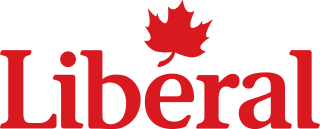
The Liberal Party of Canada is the oldest and longest-serving governing political party in Canada. The Liberals form the current government, elected in 2015. The party has dominated federal politics for much of Canada's history, holding power for almost 69 years in the 20th century—more than any other party in a developed country—and as a result, it is sometimes referred to as Canada's "natural governing party".
Contents
- Timeline
- Declared candidates
- Michael Ignatieff
- Withdrawn candidates
- Dominic LeBlanc
- Bob Rae
- Potential candidates who did not run
- Results
- References
The party's national executive met on November 8, 2008, to set rules for the contest, and chose a date and location for the convention. A biennial and leadership convention was held in Vancouver, British Columbia from April 30 to May 3, 2009, with the new leader being chosen on May 2. [1] Delegates to the convention were chosen from March 6–10, 2009, by those Liberal Party members who joined on or before February 6, 2009.

Vancouver is a coastal seaport city in western Canada, located in the Lower Mainland region of British Columbia. As the most populous city in the province, the 2016 census recorded 631,486 people in the city, up from 603,502 in 2011. The Greater Vancouver area had a population of 2,463,431 in 2016, making it the third-largest metropolitan area in Canada. Vancouver has the highest population density in Canada with over 5,400 people per square kilometre, which makes it the fifth-most densely populated city with over 250,000 residents in North America behind New York City, Guadalajara, San Francisco, and Mexico City according to the 2011 census. Vancouver is one of the most ethnically and linguistically diverse cities in Canada according to that census; 52% of its residents have a first language other than English. Roughly 30% of the city's inhabitants are of Chinese heritage. Vancouver is classed as a Beta global city.

British Columbia is the westernmost province of Canada, located between the Pacific Ocean and the Rocky Mountains. With an estimated population of 5.016 million as of 2018, it is Canada's third-most populous province.
As a result of the 2008 Canadian parliamentary crisis, culminating in Conservative Prime Minister Stephen Harper's successful appeal on December 4, 2008, to Governor General Michaëlle Jean to prorogue Parliament until January 26, 2009, there were calls by a number of prominent Liberals, including Michael Ignatieff and Bob Rae, for the leadership election process to be accelerated, so that there would be an interim leader in place by the time that Parliament resumed. Former Deputy Prime Minister and former Finance Minister John Manley, writing in The Globe and Mail on December 6, 2008, called for Dion to resign immediately. [2] Dion issued a statement on December 8 agreeing to move up his resignation.

The Conservative Party of Canada, colloquially known as the Tories, is a right-of-centre federal political party in Canada. It was formed in 2003 from the merger of the Progressive Conservative Party of Canada and the Canadian Alliance. It traces its history to the original Conservative Party of Canada that was formed after Confederation in 1867 and changed its name to Progressive Conservative Party in 1942.

The Prime Minister of Canada is the primary minister of the Crown, chairman of the Cabinet, and Canada's head of government. The current, and 23rd, Prime Minister of Canada is the Liberal Party's Justin Trudeau, following the 2015 Canadian federal election. Canadian prime ministers are styled as The Right Honourable, a privilege maintained for life.

Stephen Joseph Harper is a Canadian economist, entrepreneur, and retired politician who served as the 22nd prime minister of Canada for nearly a decade, from February 6, 2006 to November 4, 2015. Harper has served as the leader of the International Democrat Union since February 2018.
Rae and Ignatieff disagreed on how to accelerate the process, with Ignatieff favouring a vote by caucus on December 10, 2008, to select an interim leader who would then be confirmed as permanent leader in May 2009, and Rae calling for a One Member One Vote method involving the entire Liberal Party membership, to be conducted in January 2009. [3]
On December 8, 2008, Dominic LeBlanc withdrew from the race and threw his support to Michael Ignatieff. [4] [5] That evening the party executive agreed to a compromise proposal that would widen the leadership consultation process to include riding association presidents, defeated election candidates and others but rejected Rae's OMOV proposal. On December 9, 2008, Bob Rae withdrew from the race, leaving Michael Ignatieff as the presumed victor. [6]
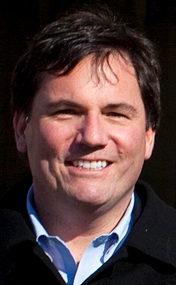
Dominic A. LeBlanc, is a Canadian lawyer and politician. He has been the member of parliament for the New Brunswick riding of Beauséjour since 2000. Since July 2018, he has been serving as Minister of Intergovernmental Affairs, Northern affairs and Internal Trade. LeBlanc is the son of former Member of Parliament, Senator and Governor General of Canada, Roméo LeBlanc.
As well as ratifying Ignatieff's leadership with the support of 97% of delegates, the convention approved an amendment to the party's constitution to institute a One Member One Vote system for the election of future leaders. [7] A proposal to adopt a weighted system where 25% of the vote in leadership elections would be reserved for members of the party's youth wing was defeated.
